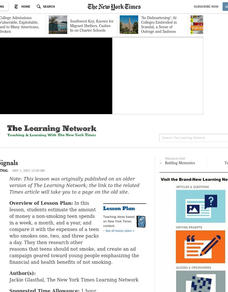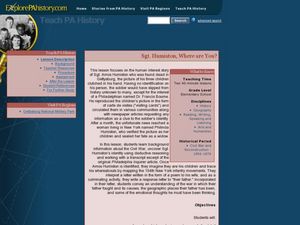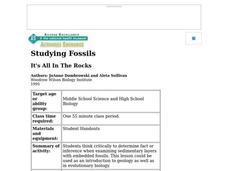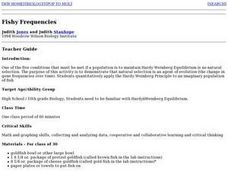Curated OER
Smoke Signals
Students estimate the amount of money a non-smoking teen spends in a week, a month, and a year, and compare it with the expenses of a teen who smokes one, two, and three packs a day. They research other reasons that teens should not smoke.
Curated OER
Measuring the Earth (Eratoshenes' method)
Sixth graders engage in problem solving, communicating, reasoning, and connecting to represent and solve problems, using geometric models.
Curated OER
Cloudy Days are for Reading and Writing
Students research weather proverbs and determine the scientific validity of 3 weather proverbs. They write an essay presenting their reasoning. They interview elderly people to graph the most frequently heard proverbs and theorize...
Curated OER
Fighting Obesity in Adolescence
Students understand the physical and cultural reasons for the growing rate of obesity in kids. They learn new ways to maintain and promote personal health through exercise and healthy eating.
Curated OER
Using Part To Whole
Students engage in a math lesson that is concerned with developing problem solving skills. They emphasize the cognitive reasoning of seeing parts as pieces to a whole. Writing is integrated into a cross-curricular study of math.
Curated OER
Torts (A/V)/Negligence/Damages
Students explore what it means to be responsible community members/citizens. They consider their duty to act as reasonable people under the circumstances and analyze a negligence case (duty, breach, damages). They detrmine their legal...
Curated OER
Putting a Face to the Numbers
Students define the term genocide in there own terms and discuss reasons why genocide occurs. In groups, students research genocides throughout history. They compile historical accounts of genocide to be include in a class compilation...
Curated OER
True Crime
Students discuss reasons for the increase in violent crime across the country. They examine the factors to which increases in violent crime can be attributed. Students brainstorm consequences of the forces that have led to the decrease...
Curated OER
In Search of Human Origins, Part II
High schoolers watch a video about the search for human origins. Using a worksheet, they identify the data trends in height of boys in North America. They discuss the significance of the data and the reasons for the increase of human...
Curated OER
Japanese Internment During World War II
Students identify, describe and discuss the reasons why Japanese-Americans were placed in internment camps and what life was like at these camps. Then they write an unsent letter to a family member on the East Coast describing their...
Curated OER
Sgt. Humiston, Where are You?
Students become familiar with the events of the Civil War. In this identification lesson plan, students use deductive reasoning to understand how the deceased soldier was identified. Students view primary documents for...
Curated OER
We The People: A History
Students play a game about taxation where they have tax collectors that simulate the feelings and reasons that led to the American Revolution. In this taxation lesson plan, students learn about why the people in the colonies were so...
Curated OER
The Crusades
Young scholars discover the reasons the Crusades were fought. In this Crusades lesson, students break into groups and research what happened, who was involved and the outcome. Young scholars create a poster with the information and...
Curated OER
Why do People Migrate?
Second graders examine the reasons for human migration. In this human migration lesson, 2nd graders make lists of reasons why people migrate. Students view pictures of people who have migrated and discuss why. Then the students watch a...
Curated OER
What's in a Willow?
Students study of nutritional value of edible native plants. discriminate between foods that have nutritional value and those that do not. They relate how food can affect how they think, feel, and perform.
Curated OER
Christopher Columbus
Students read about the good and bad aspects of Christopher Columbus in Jean Fritz's book, "Where do you think you're going, Christopher Columbus?" They conduct and analyze a survey about common myths and create a pop-up book.
Curated OER
Colonial History: Fearless and faaithful
Students discuss reasons why early europeans immigrated to North America. Working in groups, they complete Internet activities on the PBS Website. They take a simulated voyage to the new world and rercord their actions on worksheets. ...
Curated OER
Weather Words
Students brainstorm and define five terms for precipitation, discuss reasons why English language includes various terms for wet weather, and create word games such as jumbles, word searches, or crossword puzzles with weather terms.
Curated OER
Environmental Health Ethics
Students use inductive reasoning to study different scenarios related to environmental issues. They evaluate various scenarios to develop common definitions and key concepts in environmental health ethics.
Curated OER
It's All in the Rocks
Students think critically to determine fact or inference when examining sedimentary layers with embedded fossils. They are being introduced to geology as well as evolutionary biology.
Curated OER
Fishy Frequencies
Tenth graders demonstrate that natural selection is an agent of evolution. They quantitatively apply the Hardy-Weinberg Principle to an imaginary population of fish. They utilize math and graphing skills, collecting and analyzing data,...
Curated OER
Graphing Difference
Students use problem solving skills to reason, predict and problem solve through exploration. They recognize a way in which they are different from their peers and create a graph that shows these differences.
Curated OER
"Dreaming of Success" Unit
Students recognize the importance of planning for the future. They think about and project themselves into the future. Students become aware that everyone encounters challenges in life and that they can be met and obstacles can be...
Curated OER
Progression of Political Movements
High schoolers examine the various political parties throughout history. In groups, they are given documents identifying the platforms of the parties in the 1868 election. To end the lesson, they share their information with the class...

























